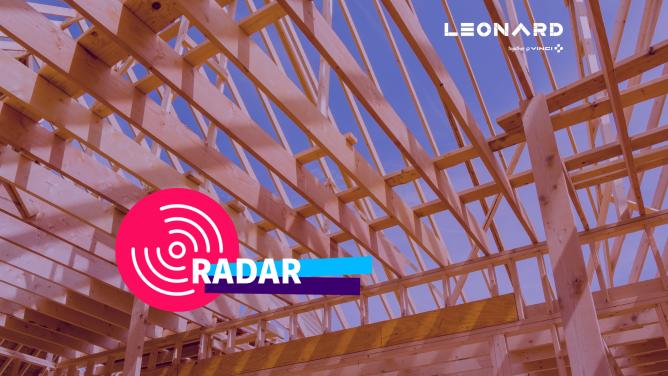More than $50 billion will be invested in climate tech start-ups by 2022, according to a PWC study, or just over a quarter of all venture capital funds. The appetite for the sector is growing steadily, and even accelerating, but not for everyone: this phenomenon benefits above all early-stage start-ups, less so the more mature structures, which face more difficulties in continuing to raise funds.
The role of regulation
How can this attraction be explained? Regulations are intensifying in all sectors, such as the one affecting construction since the RE2020 came into force in France (Environmental Regulations), which defines the maximum carbon footprint of a new building to authorise its construction. As the current ways of building are not compatible with the highest thresholds of this regulation, which will become stricter until 2030, investing in innovation has become a must for the financiers of construction technologies (contech). We can also note the knock-on effect initiated by public investment plans (law on renewable energy, France 2030, Biden plan in the USA, etc.) which are mobilising more and more funds for the ecological transition. Finally, we must not overlook the dry powder phenomenon: investment funds have substantial reserves, a significant proportion of which is already earmarked for climate tech.
Investors’ Voices :
What prospects do investors envisage more specifically in the climate tech sector? Mauricio Weiss, Zacua Ventures analyses:
“Our latest study reveals that a majority of investment funds intend to increase their investments in the sustainability field. 30% would like to increase their investments in new building materials. Regulatory pressure has a direct effect on investment priorities. Market uncertainties, on the other hand, are forcing investors to refocus on their core businesses and key regions, which means more challenges for start-ups who would like to attract international or multi-vertical funds.
Mathias Flattin of Axeleo Capital confirms the refocusing of investment on start-ups that can address the most critical issues highlighted by the environmental crisis:
With the accumulation of crises, priorities are changing: less nice to have, more must have, i.e. a refocusing on the essentials, the real needs, and less speculation. For entrepreneurs, this means being able to demonstrate an impact, providing solutions through innovation to societal and environmental problems in order to attract investment from the start.
Funding Journey
Three start-ups that have benefited from Leonard’s support and financing through the SEED programme testify to their financing paths.
CAELI ÉNERGIE
Rémi Perony, President and founder
Creation date: 2020
Elevator pitch: We design and manufacture a low carbon air conditioning system
Financing path: a first €200k seed funding from the Grenoble SATT network, then the French Tech Emergence grant and an honorary loan from the Entreprendre Isère network, Deep Tech grants, and the first bank loans. The early stage is quite fluid when you tick the ‘right boxes’ in the French investment ecosystem: credible scientific/technological fundamentals, significant market potential and a good team. The knock-on effect of these public funds is very clear. But then you have to quickly raise funds, and that’s more difficult, because investors are still focusing on questions that Deep Tech startups can’t answer, especially time-to-market. Gradually, however, we are seeing a renewed interest in hardware and risk. The entire investment sector needs to move towards other types of indicators for decision-making; today’s indicators are still too calibrated for digital companies with a clear path.
OSTREA
Tanguy Blévin, co-founder
Creation date: 2022
Elevator pitch: an industrial start-up that recycles shellfish waste (oysters, mussels, scallops) into innovative, low-carbon impact materials
Financing: €50k in ante-creation aid via the Emergys grant from Bpifrance and the Brittany region, and integration into the regional technology park, which enabled us to develop the first version of our material and test its appeal with the first prospects. Then we raised debt from banks, received aid from the region and donor loans from the Entreprendre and Initiative networks, to set up our first small factory and start marketing. Today we are preparing our first fundraising, 90% secured, to adapt our means of production, recruit and invest in R&D. What has made the difference is the support and our territorial anchoring: there are many public aids and schemes but it’s complicated to understand them well and then to put together the applications. Our mentors, the technology park and the local business angels’ networks have been invaluable in helping us to work out our ambitions and find the right mechanisms to use. It’s a full-time job, but it pays off: being supported by innovation structures and the region gave us almost immediate credibility. It is a big issue for the Breton oyster sector and for the region, and we were able to join a dynamic to quickly prove our usefulness.
EP TENDER
Jean-Baptiste Segard, CEO and founder
Founding date: 2012
Elevator pitch: We are accelerating the energy transition of consumer electric vehicles, thanks to our smart powerbank trailer rented on demand for occasional long-distance trips.
Funding journey: I had underestimated the difference in culture between finance and the automotive industry. In finance, risk is an asset, a commodity, with rapid decision cycles. In the automotive industry, risk is a factor to be minimised or even avoided, with decisions requiring a consensus of the entire organisational matrix and a long cycle. Getting an external disruptive solution adopted is a formidable challenge. Public support and own resources have enabled us to get through the technical proof of concept and digital market modelling stages. But there is a gap once we have passed these initial stages: VC funds have become very cautious about hardware, especially when it involves a new business model that has not yet been demonstrated. We hope to achieve this by combining public funding, a manufacturer and a financial investor or other player in the sector. The environmental and social stakes deserve it!
Leonard and the financing of innovation
The SEED programme finances and supports start-ups at the seed stage. Selected for the innovative solutions they propose in the construction, mobility, real estate and energy sectors, they benefit from six months of training by experts from Stanford University, workshops, coaching sessions, and contacts with VINCI mentors and the network of investors led by Leonard. In four promotions, 30 start-ups have been supported in this way. In 2022, Leonard committed to a BSA Air approach to support their development: these “share subscription warrants – rapid investment agreement” allow start-ups to defer their investors’ entry into the capital until the first fund-raising, while immediately benefiting from funds for their growth.


